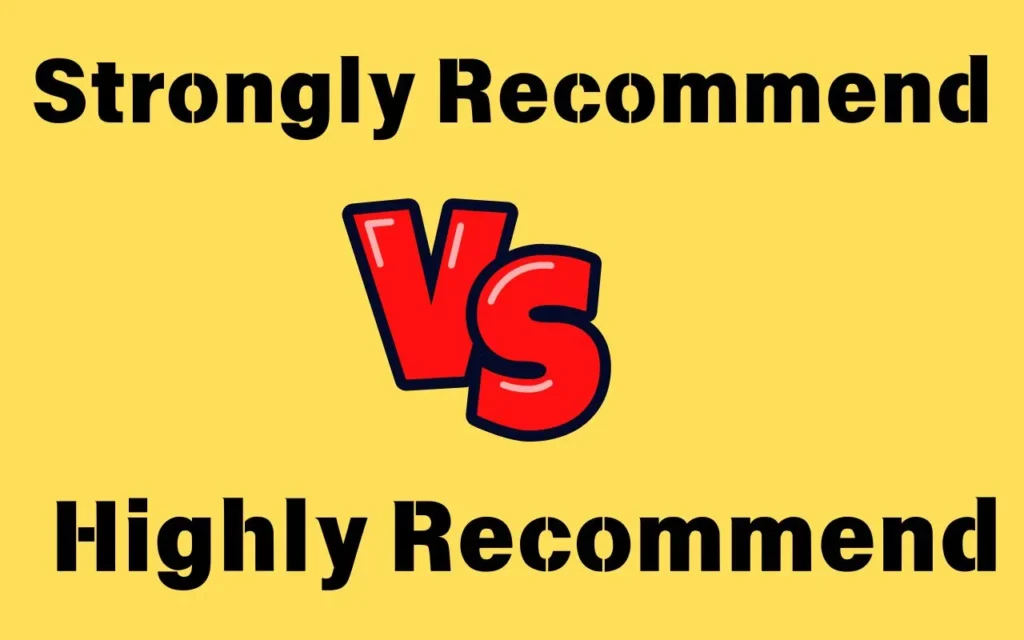Last updated on April 27th, 2025 at 12:04 pm
In everyday communication, we often hear phrases like strongly recommend and highly recommend. While these expressions may seem interchangeable at first glance, they carry subtle differences in tone, intent, and application.
Understanding the nuances of these phrases can help you use them more effectively, whether you’re writing a review, giving advice, or offering a suggestion.
Let’s break down the differences, contexts, and best uses of these commonly used recommendation phrases.
Introduction to Recommendation Phrases
Recommendation phrases play a vital role in how we communicate support or approval. They help convey our level of enthusiasm, trust, or conviction about a particular subject.
For example, saying, “I strongly recommend this book” implies a personal conviction, whereas “I highly recommend this book” might focus more on its broad appeal or quality. These subtle differences can make a big impact on how your message is received.
By exploring the nuances of strongly and highly recommend, we’ll uncover how these terms differ in tone and usage.
Is it better to say “strongly recommend” or “highly recommend”? Learn the key differences, examples, and best practices to master these phrases!
The Nuances of “Strongly Recommend”
Emphasizing Urgency and Conviction
The phrase strongly recommend conveys a sense of personal urgency or deep conviction.
It’s often used when you feel passionately about your suggestion or when there’s a significant reason behind the recommendation.
Examples:
- “I strongly recommend using sunscreen to protect your skin from UV damage.”
- “We strongly recommend following safety protocols during the experiment.”
Here, the emphasis lies on strength and necessity. The suggestion carries weight, urging the listener to act immediately or consider the advice seriously.
The Subjectivity of “Strongly Recommend”
One key nuance of strongly recommend is its subjectivity. This phrase often reflects personal experience or strong emotional involvement.
For instance:
- “I strongly recommend this restaurant—it’s my absolute favorite!”
- “If you’re visiting Italy, I strongly recommend exploring Florence.”
In these cases, the recommendation stems from individual preferences, making it more personal and heartfelt.
When to Use “Strongly Recommend” in Communication
Using strongly recommend is appropriate when:
- You want to convey urgency or necessity.
- Your recommendation is based on personal experience or expertise.
- The stakes are high, and you need to stress the importance of action.
Examples of Usage:
- Workplace: “We strongly recommend updating your password to improve security.”
- Health: “Doctors strongly recommend regular exercise to maintain heart health.”
By choosing this phrase, you align your recommendation with authority and conviction, making it more impactful.
Breaking Down “Highly Recommend”
The Contextual Use of Recommendations
On the other hand, highly recommend suggests a more general endorsement. It’s often used to highlight excellence, quality, or widespread approval. The tone is enthusiastic but less urgent compared to strongly recommend.
Examples:
- “I highly recommend this movie—it’s a masterpiece!”
- “We highly recommend this product based on customer reviews.”
Here, highly recommend conveys enthusiasm for something that’s widely appreciated or objectively commendable.
Positive Consensus: Using “Highly Recommend”
Unlike strongly recommend, which can feel personal, highly recommend often implies positive consensus. It’s suitable for situations where your suggestion aligns with popular opinion or general quality standards.
For instance:
- “This hotel is highly recommended for its excellent service and amenities.”
- “I highly recommend this book—it has received glowing reviews from critics.”
This phrase works well when your recommendation is based on external validation rather than personal conviction.
Personal Advice: The Case for “Strongly Recommend”
When giving personal advice, strongly recommend is often more effective. It emphasizes your personal connection to the advice and adds a layer of sincerity.
Example:
- “If you’re struggling with time management, I strongly recommend using a planner.”
This approach makes the suggestion feel tailored and genuine, building trust with your audience.
Real-World Examples: How “Strongly” and “Highly” Impact Meaning
Example 1: Travel
- Strongly Recommend: “I strongly recommend visiting the Louvre if you’re passionate about art history.”
- Highly Recommend: “The Louvre is highly recommended by travel experts and guides.”
Example 2: Products
- Strongly Recommend: “I strongly recommend this laptop for graphic design—it’s the best I’ve ever used.”
- Highly Recommend: “This laptop is highly recommended for its speed and performance.”
Key Difference: Strongly conveys personal conviction, while highly reflects general approval or quality.
Substitutes for “Strongly Recommend” and “Highly Recommend”
To keep your writing varied, consider these alternatives:
Alternatives for “Strongly Recommend”
- “I urge you to…”
- “I insist on…”
- “I firmly believe…”
Alternatives for “Highly Recommend”
- “I wholeheartedly endorse…”
- “I give my highest praise to…”
- “This comes with my full recommendation…”
Using these variations can enhance your communication while avoiding repetition.
FAQs
What is the difference between “strongly recommend” and “highly recommend”?
“Strongly recommend” emphasizes urgency and personal conviction, while “highly recommend” highlights quality or widespread approval.
When should I use “strongly recommend”?
Use “strongly recommend” when expressing personal urgency, conviction, or necessity, such as in advice or important suggestions.
Is “highly recommend” less personal than “strongly recommend”?
Yes, “highly recommend” often implies external validation or general quality rather than personal conviction.
Can I use “highly recommend” in professional reviews?
Absolutely! “Highly recommend” is ideal for professional or objective endorsements based on quality or popular opinion.
Are there alternatives to “strongly recommend” and “highly recommend”?
Yes! For “strongly recommend,” try “I urge you to” or “I insist on.” For “highly recommend,” use “I wholeheartedly endorse” or “I give my highest praise to.”
Conclusion
Choosing between strongly recommend and highly recommend depends on the tone and context of your message.
- Use strongly recommend to convey urgency, personal conviction, or emotional involvement.
- Use highly recommend for endorsements based on quality, excellence, or popular consensus.
By understanding these differences, you can tailor your recommendations to be more effective and impactful. Whether you’re writing a review, offering advice, or persuading someone to act, these phrases will help you communicate with clarity and precision.





